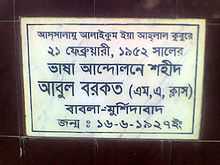Abul Barkat
Abul Barkat (Bengali: আবুল বরকত ) (June 16, 1927 – February 21, 1952) was a demonstrator killed during the Bengali Language Movement protests which took place in the erstwhile East Pakistan (currently Bangladesh), in 1952.
Background

Abul Barkat was born at village Babla in Bharatpur Thana of Murshidabad, Bengal (now in India) and migrated to Bangladesh (the then East Pakistan) in 1948. Barkat was the son of Shamsuddin.
He passed his matriculation from Talibpur High School in 1945 and passed the intermediate from the Berhampore Krishnath College in 1947, as a student of the University of Calcutta. He came to East Bengal after the partition of India in 1948, and resided at his uncle's house named “Bishnupria Bhaban”. In the same year he got admitted to Dhaka University to study political science. He received his honors in 1951 where he stood fourth in the second class. He was a Masters student of the University of Dhaka.
Events
Abul Barkat was not an active politician but a politically conscious one. On February 21, 1952 while the students were violating the rule 144 on the road in front of Dhaka Medical College , police started firing and a bullet hit Barkat who was standing under the no. 12 shed of the hostel. Barkat was seriously injured and later died at the Dhaka Medical College at about 8 PM that day. Later he was buried in the Azimpur Graveyard.
Legacy
Abul Barkat was awarded Ekushey Padak in 2000.
External links
- Short biography in Prime Minister's official web site, Govt of Bangladesh
| ||||||||||||||